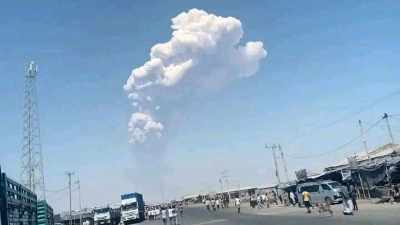Ramabai Nagar revamp takes off; memorial for Mata Ramabai Ambedkar announced
Maharashtra CM Fadnavis lays foundation stone; project estimated to be completed in 36 months.
 Mata Ramabai Ambedkar Nagar and Kamraj Nagar Slum Rehabilitation Project Bhoomi Pujan Ceremony. Express Photo by Deepak Joshi)
Mata Ramabai Ambedkar Nagar and Kamraj Nagar Slum Rehabilitation Project Bhoomi Pujan Ceremony. Express Photo by Deepak Joshi)The long-awaited redevelopment of Ghatkopar’s Ramabai Ambedkar Nagar and Kamaraj Nagar took off on Tuesday, with Chief Minister Devendra Fadnavis laying the foundation stone.
At the event, also attended by Deputy Chief Minister’s Eknath Shinde and Ajit Pawar, Shinde announced building up of a memorial for Mata Ramabai Ambedkar, wife of Dr. Babasaheb Ambedkar, at the project site.
The Rs 1,299-crore cluster redevelopment project will be jointly implemented by the Mumbai Metropolitan Region Development Authority (MMRDA) and the Slum Rehabilitation Authority (SRA). The entire project, estimated to be completed in 36 months.
The redevelopment has gained urgency due to the proposed expansion of the Eastern Freeway corridor from Ghatkopar to Thane, which required the relocation of certain slum clusters in Ramabai Ambedkar Nagar and Kamaraj Nagar.
Officials said the project will not only provide secure housing but also free up land needed for critical transport infrastructure.
At the foundation laying ceremony, Fadnavis said that they will complete the project within the term of this government.
“All SRA projects will be completed in time and we will also come for the inauguration of this project during the term of this government,” Fadnavis said.
“Through cluster redevelopment, we have taken up the task of slum rehabilitation. The government will ensure that slum dwellers receive beautiful, fully equipped homes free of cost. No one will be deprived of development or a house,” said Fadnavis adding that “The dream of owning a home for residents of Ramabai Ambedkar and Kamaraj Nagar will not remain on paper. Within two years, modern and well-equipped houses will rise in this area.”
He added, “Our government is committed to making Mumbai slum-free through cluster redevelopment, providing not just homes but comprehensive facilities. The redevelopment of Dharavi, Mumbai’s largest slum, will be completed in the next seven years, giving around 10 lakh families their rightful homes and providing space for 2 lakh artisans to set up their workshops.”
Speaking at the event, Shinde, who is also housing minister, said the project would transform the lives of nearly 17,000 families living in Ramabai Nagar and Kamaraj Nagar for decades.
“For 40 years, these residents have lived in difficult conditions. Their struggles finally end today. Diwali may be next week, but for these families, their real Diwali is today,” Shinde said.
He said that during his previous tenure as Chief Minister, the government had distributed rent cheques worth Rs 150 crore to help residents during relocation. “That was the moment people began believing their homes would finally be built,” he added.
The cluster redevelopment proposal, first initiated during former Chief Minister Prithviraj Chavan’s tenure, had been pending for nearly 15 years before gaining traction under the BJP-led government.
“As Chief Minister, I ensured the plan was taken forward. There is no private builder involved — MMRDA is the developer. This will ensure quality construction and timely completion,” Shinde said, adding that the MMRDA and SRA would complete the work within the next three to four years.
Spread across 31.82 hectares, including 15.63 hectares of government-owned land, the project will provide each eligible family with a 300 sq ft apartment equipped with modern amenities.
So far, over 10,000 households have been verified as eligible, and most have signed agreements with the authorities.
The MMRDA has already disbursed Rs 137.5 crore as two years’ advance rent to residents.
Situated adjacent to the Eastern Express Highway, the site has strong connectivity — about 2.5 km from Ghatkopar railway station, 4.8 km from the airport, and 9.5 km from the upcoming Mumbai Trans Harbour Link, apart from being linked to major arterial roads.
Calling the project a turning point in Mumbai’s redevelopment journey, Shinde said, “This is not just about giving homes — it’s about improving lives. This is only the trailer, the full picture is yet to come.”
He said the government would fast-track pending housing projects under MHADA, CIDCO, SRA, MIDC and BMC. “We have amended SRA policies to promote affordable housing, hostels for students, and homes for police personnel and mill workers,” Shinde added.
The plan includes residential, commercial, and community spaces with infrastructure such as schools, gardens, health centres, solar panels, sewage treatment, and rainwater harvesting systems.







